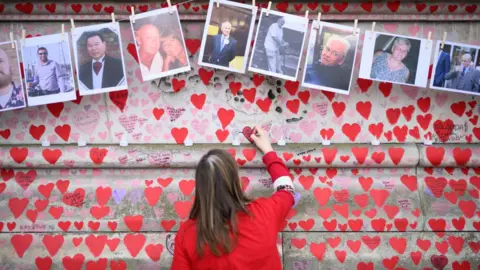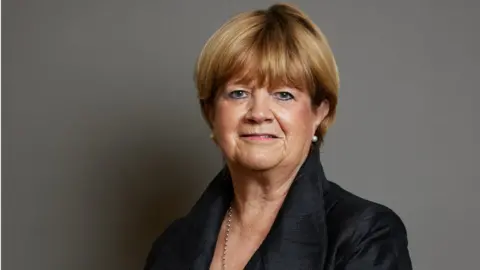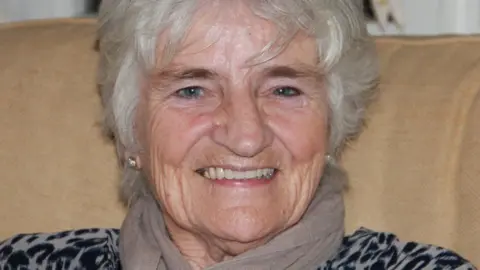Loss and suffering at heart of Covid inquiry
 Getty Images
Getty ImagesThose who have suffered will be at the heart of the Covid public inquiry, the chair of the inquiry has promised during the first preliminary hearing.
Baroness Hallett said the pandemic had caused loss to millions of people.
She said that included those who have seen loved ones die, been left in poor health, had education disrupted and suffered economic hardship.
It came as the inquiry holds a one-day hearing on its first "module" - pandemic preparedness.
Other modules will cover political decision-making at the start, the health system, vaccines, test-and-trace and health inequalities.
The hearing had originally been scheduled for last month, but was delayed after the death of Queen Elizabeth II.
'Millions of people have suffered loss'
Just before a minute's silence was held for those who lost their lives, Lady Hallett said: "There's one word that sums up the pandemic for so many - and that is the word 'loss'.
"Although there were positive aspects of the pandemic, for example the way in which communities banded together to help each other and the vulnerable, millions of people suffered loss, including the loss of friends and family members; the loss of good health - both mental and physical; economic loss; the loss of educational opportunities and the loss of social interaction.
"Those who are bereaved lost the most. They lost loved ones and the ability to mourn properly."
 UK Parliament
UK ParliamentLady Hallett said she would do "everything in her power" to explore what happened and what lessons needed to be learned, saying the inquiry would be "thorough and fair".
"Those who have suffered will be at the heart of the inquiry," she added.
During the session in London it was also announced which individuals and organisations will be core participants for the first module - this entitles them to access documents and make submissions.
Groups representing bereaved relatives, government departments, the health secretary, the UK Health Security Agency and NHS England have all been appointed core participant status, alongside public health officials and ministers in the devolved nations.
Lawyers have also been setting out how the inquiry will proceed. Members of the public and other groups not awarded core participant status will still get to submit evidence, and there will be more informal listening events around the country which people can attend.
The public hearings where people are called to give evidence do not start until the spring. But the start of the first preliminary hearing is still being seen as an important milestone for the families who lost loved ones.
However, the Covid-19 Bereaved Families for Justice campaign said the listening exercise was flawed.
Group co-founder Matt Fowler said he was concerned families would be marginalised, since the listening exercise was being run by a third-party, including PR firms that had won government contracts during the pandemic.
"This clearly risks a conflict of interest, and it's hard to see how we can have confidence that our experiences will be listened to accurately and fairly," he said.
'We need answers and people held to account'
 Family photo
Family photoLindsay Jackson's mother, Sylvia, 87, died from Covid during the first lockdown, after contracting it at a care home.
Ms Jackson, of the Covid-19 Bereaved Families for Justice campaign group, said it was essential lessons were learned.
She was "really pleased" the inquiry was finally starting, but said it had taken too long to reach this stage.
"It's two-and-a-half years since the pandemic started. We lost so many people. If people have done things wrong, they need to be held accountable.
"For me, my family and the others who lost loved ones, it's important that answers are found to the questions that we have."
Several reports have already put the UK government's handling of the pandemic at the start, under the spotlight.
Last year, a report by MPs on the Health and Social Care Committee and the Science and Technology Committee, said the UK's failure to do more to stop Covid spreading early in the pandemic was one of the country's worst public health failures.
It said the government approach - backed by its scientists - to try to manage the situation and in effect achieve herd immunity by infection had delayed the first lockdown, costing thousands of lives.
And a report by spending watchdog the National Audit Office, published in late 2021, found ministers had not been properly prepared for a pandemic like Covid-19 and lacked detailed plans on shielding, job-support schemes and school disruption.
One issue likely to come under scrutiny in module one is how much was learned from Exercise Cygnus, a 2016 government exercise simulating a flu pandemic.
Meanwhile, Lady Poole, the judge appointed in December, to lead the inquiry into the Scottish government's Covid response has resigned from the role for personal reasons.
